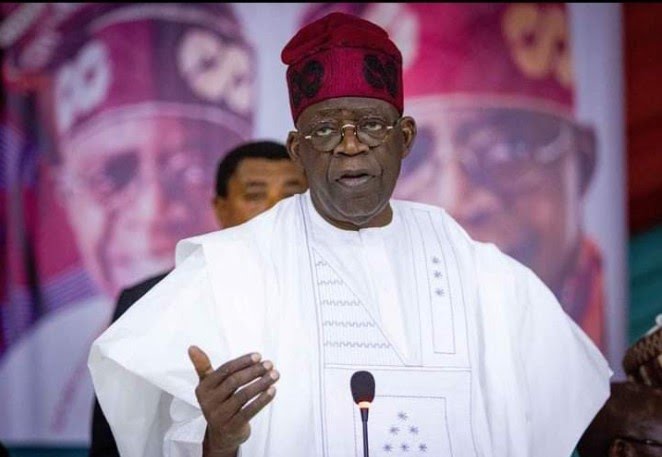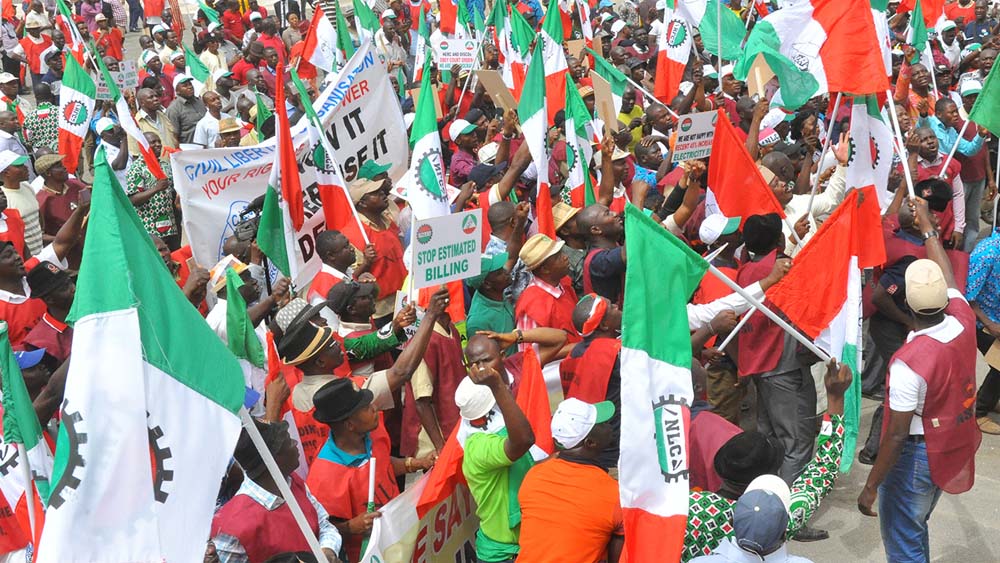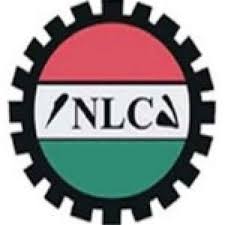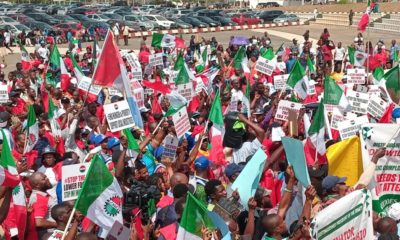NEWS
BREAKING: Jos DisCo, NERC Shut Down As NLC Begins Protest
On Monday, members of the Nigerian Labour Congress and the Trade Union Congress in Plateau State staged a protest at the headquarters of the Jos Electricity Distribution Company in Jos, the state capital.
They also picketed the Nigerian Electricity Regulatory Commission offices at the Gold and Base axis, leaving workers stranded.
The State Chairman of the NLC, Eugene Mangji, leading the union members, stated that the protest was in adherence to their national secretariat’s directive to oppose the recent increase in the country’s electricity tariff.
The NLC chairman said “We have shot down the NERC office at Gold and Base. Right now, we are the JED headquarters at the Ahmadu Bello Way. We will continue until the right thing is done.
“We believe that this decision is not just morally reprehensible considering the difficulties Nigerians are faced with currently, but it blatantly disregards fundamental principles and statutory obligations.
‘’It is a slap in the face of justice and fairness, and we will not stand idly by as the masses and workers are subjected to such unacceptable exploitation.
“As the electricity sector regulator, it is imperative that your commission grasps the weight of its responsibilities. NERC’s role entails the regulation of electricity tariffs in the country, a duty outlined in explicit detail within the statutes governing the commission.
“Yet, with this recent tariff hike, which you have consented to, it is evident that the Commission has forsaken its duty and abandoned the people it was meant to protect to the fat cats in the electricity industry.
“We are miffed that NERC has become a tacit collaborator in crafting the oppressive pricing regime being perpetuated against Nigerian workers and people. The Laws that set up the commission mandate it to act as an unbiased ombudsman in the electricity industry.
“Unfortunately, the reverse is the case as it has acted in cahoots with the Distribution Companies, DisCos, and the Generating Companies, GenCos, to promote their nefarious market practices.
“The announced tariff hike not only defies the established procedure mandated by law but also tramples upon the rights of Nigerian citizens. It is a flagrant abuse of power and a clear violation of the trust bestowed upon your commission by the Nigerian people. Such actions will not be tolerated, and we refuse to accept them as the new norm.
“Nigerian workers and masses led by the Nigeria Labour Congress, NLC, and the Trade Union Congress of Nigeria, TUC, stand united in denouncing this injustice. We must defend the rights of our fellow citizens against exploitation.
“Therefore, we demand an immediate reversal of the hike in electricity tariff to N65/kwh, immediate cessation of the discriminatory practice of segregating electricity consumers into arbitrary bands, and restoration of the supremacy of the statutes governing the conduct of operators within the electricity industry.
“We give you until Sunday, May 12, 2024, to comply. Failure to do so will result in swift and decisive action on our part as we will not hesitate to mobilise our members and occupy all NERC’s offices and those of the DisCos nationwide until justice is served.”
NEWS
Tinubu Appoints Vice Admiral Ibas As Rivers Administrator

President Bola Ahmed Tinubu has appointed retired Vice Admiral Ibokette Ibas as the military administrator of Rivers State following the suspension of Governor Siminalayi Fubara, his deputy, Ngozi Odu, and all elected members of the state House of Assembly.
The announcement came during a nationwide broadcast on Tuesday amid heightened political tension in the oil-rich South-South state.
Tinubu said the suspension would last for an initial period of six months.
READ ALSO: JUST IN: Tinubu Suspends Fubara, Deputy and Lawmakers
“By this declaration, the Governor of Rivers State, Mr. Siminalayi Fubara, his deputy, Mrs. Ngozi Odu, and all elected members of the House of Assembly of Rivers State are hereby suspended for an initial period of six months,” the President stated.
Ibas, a former Chief of Naval Staff who served from July 2015 to January 2021, will take charge of the state’s affairs.
Tinubu clarified that the judiciary remains unaffected and will continue to function as mandated by the constitution.
“The Administrator will not make any new laws. He will, however, be free to formulate regulations as may be found necessary to do his job, but such regulations will need to be considered and approved by the Federal Executive Council and promulgated by the President for the state,” Tinubu added.
NEWS
JUST IN: Tinubu Suspends Fubara, Deputy and Lawmakers

President Bola Ahmed Tinubu has suspended Rivers State Governor Siminalayi Fubara, his deputy, Mrs. Ngozi Odu, and all elected members of the state House of Assembly for an initial period of six months.
Tinubu made the announcement in a nationwide broadcast on Tuesday, citing undisclosed reasons for the decision.
READ ALSO: JUST IN: Rivers Assembly Accuses Fubara, Deputy Of Gross Misconduct
“By this declaration, the Governor of Rivers State, Mr. Siminalayi Fubara, his deputy, Mrs. Ngozi Odu, and all elected members of the House of Assembly of Rivers State are hereby suspended for an initial period of six months,” the President stated.
The suspension comes amid ongoing political tensions in Rivers State.
More updates to follow…
NEWS
JUST IN: Wike Renders PDP Homeless In Abuja
In what political watchers perceive as part of efforts to discomfit and scatter the Peoples Democratic Party (PDP) on the feeling that its National Working Committee (NWC) antagonises him, the Minister of Federal Capital Territory, Nyesom Wike, has revoked the rights to occupy the land on which the party’s national secretariat, Abuja is sited.
Biztelers reports that Wike’s revocation notice was conveyed in a letter released in Abuja on Tuesday, dated March 13, 2025.
The letter was titled, “Notice of right of occupancy with file no: MISC 81346 in respect of plot no: 243 within central area district, Abuja.”
ALSO READ: Explosion Hits Trans-Niger Oil Pipeline In Rivers
The letter was signed by the Director, Land Administration (FTC), Chijioke Nwankwoeze.
Wike, it was gathered predicated his action on the PDP’s failure to pay the annual ground rents due on the property for twenty (20) years, from January 1, 2006, to January 1, 2025.
The negligence on the part of the opposition party, the letter claimed was despite many publications in several national dailies and electronic media to pay up every outstanding bill and ground rent on its property.
The letter read, “I have been directed to refer to the above Right of Occupancy granted to PEOPLES DEMOCRATIC PARTY (PDP), NATIONAL SECRETARIAT and inform you that the Minister of Federal Capital Territory has in the exercise of powers conferred on him under the Land Use Act No. 6 of 1978, Cap. L5, Laws of the Federation of Nigeria 2004, revoked your rights, interests and privileges over Plot No. 243 within Central Area, Cadastral Zone A00, Abuja.
“The revocation is in view of your continued contravention of the terms and conditions of grant of the Right of Occupancy by failing to pay the annual ground rents due on the property for twenty (20) years, from Ist of January 2006 to 1st of January 2025. This is despite the many publications made by the FCT Administration since 2023 in several national dailies and on electronic media requesting all allottees of plots in the Federal Capital Territory to pay up every outstanding bill and ground rent on their property.
“You would please note that the said breaches by PEOPLES DEMOCRATIC PARTY (PDP), NATIONAL SECRETARIAT (MISC 81346) run contrary to the provisions of Section 28, Subsection 5 (a) and (b) of the Land Use Act.”
There are palpable fears that the PDP’s national secretariat might be demolished or vandalised, sooner than later because Wike added that the FCTA administration would take immediate possession of the party secretariat until all bills are settled.


















